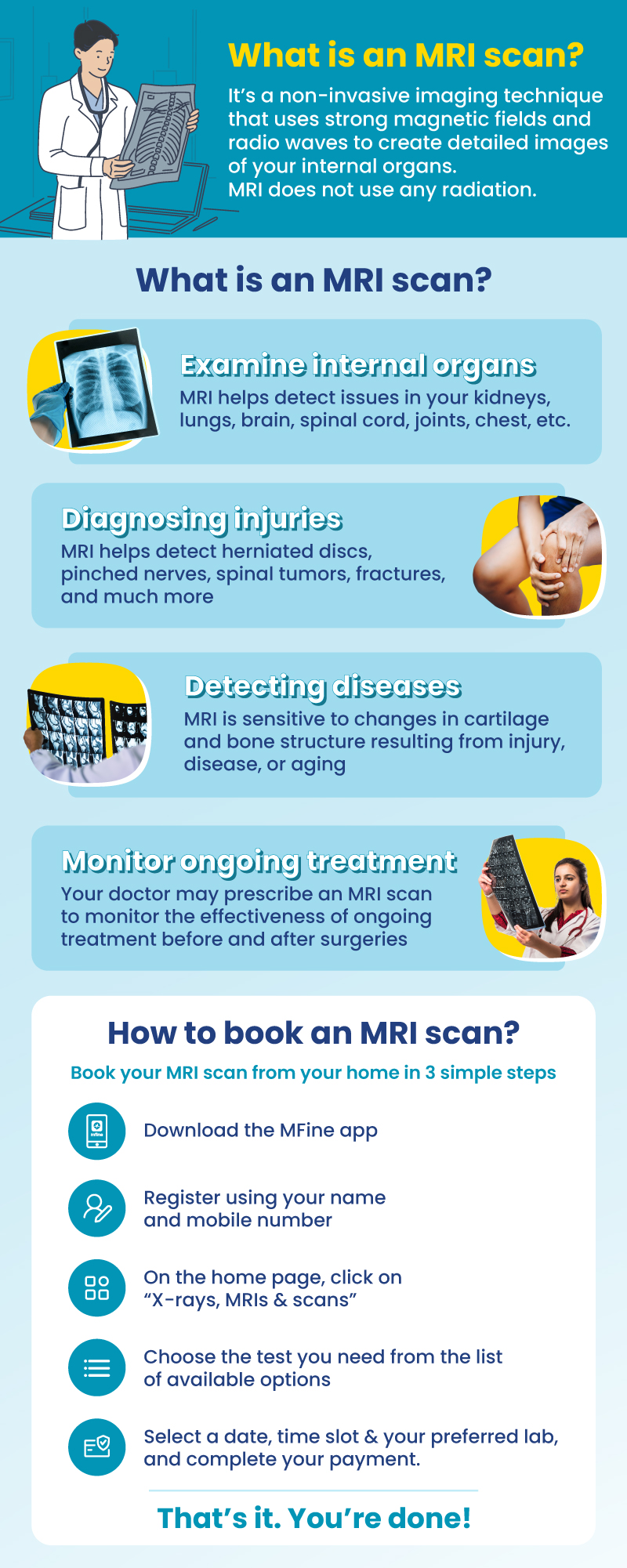
Take advantage of this exclusive offer and get up to 50% off on MRI Scan cost in Pune, all while maintaining uncompromising quality for your scans.
At our facility, we understand the importance of accurate and reliable MRI scans for proper diagnosis and treatment. That’s why we are committed to providing top-notch services without cutting corners on quality.
MRI Scan in Pune by MFine
|
Don’t miss out on this exclusive deal! Get an MRI scan in Pune for just ₹3500, a significant discount from the usual market price of over ₹7500.
Contact us at ☏08061970525 or click the button below to request a callback.
Also, when you book a scan with us, you will also get a FREE online consultation with a doctor as our complimentary service!
MRI Scan Cost in Pune
We’ve compiled a detailed list of the most frequently performed MRI scans in Pune, along with their discounted prices. It’s worth noting that these prices may change over time. If you want to stay up-to-date on current rates, please don’t hesitate to reach out to us.
MRI Scan Cost List in Pune |
Offer Price |
| Brain MRI Scan Cost in Pune | ₹5196 |
| Spine MRI Scan Cost in Pune | ₹5196 |
| Knee MRI Scan Cost in Pune | ₹5196 |
| Chest MRI Scan Price in Pune | ₹5996 |
| Ankle MRI Scan Price in Pune | ₹5996 |
| MRI Elbow Price in Pune | ₹5950 |
| Shoulder MRI Scan Cost in Pune | ₹5950 |
| MRI Whole Abdomen Price in Pune | ₹11900 |
| MRI Neck Price in Pune | ₹5950 |
| MRI Brain Contrast Price in Pune | ₹8950 |
| MRI Chest Contrast Price in Pune | ₹9375 |
| MRI Spine Contrast Price in Pune | ₹9375 |
Contact us at 08061970525 for MRI tests in Pune. We’ll provide cost details and help you schedule a convenient appointment.
Why should I book an MRI through MFine?
|
Exclusive Benefits with MFine
(1) Certified labs
Get access to over 600+ labs certified by NABL and NABH
(2) Same-day slot available
Get scans done on the same day
(3) Quick and convenient
Get reports in 12 hours and digital films in 15 – 20 minutes
(4) FREE Consultation
Post scans, consult a doctor for free to review your report
Understanding MRI: Types of Scans and Preparation Tips
MRI, short for Magnetic Resonance Imaging, is a powerful medical imaging technique used to visualize internal structures of the body in great detail. If you’re scheduled for an MRI scan, it’s natural to have questions and concerns. Therefore, let’s explore the various types of MRI scans available and offer some valuable tips on what to do before your MRI appointment.
Types of MRI Scans
MRI technology has evolved over the years, leading to the development of different types of MRI scans. Each type serves a specific purpose, aiding doctors in diagnosing various medical conditions more effectively.
- Brain MRI: This type of MRI focuses on capturing detailed images of the brain’s structure. It is commonly used to detect brain tumors, evaluate brain injuries, and investigate neurological disorders.
- Spine MRI: A spine MRI is employed to examine the spinal cord and surrounding tissues. It helps in identifying herniated discs, spinal cord injuries, and spinal tumors.
- Abdominal MRI: This MRI scan provides clear images of the abdominal organs, such as the liver, kidneys, pancreas, and spleen. It is useful in diagnosing gastrointestinal issues, liver diseases, and other abdominal abnormalities.
- Cardiac MRI: Cardiac MRI is specialized for assessing the heart’s structure and function. It aids in the diagnosis of heart diseases, heart muscle damage, and congenital heart defects.
- Musculoskeletal MRI: Used to assess joints, muscles, and bones, musculoskeletal MRI is valuable in diagnosing sports injuries, arthritis, and other orthopedic conditions.
- Breast MRI: Breast MRI is often recommended for further evaluation after mammograms, particularly for individuals with a higher risk of breast cancer.
Open-bore vs. Closed bore MRI machines
MRI machines come in two primary configurations: closed bore and open bore.
- Open Bore MRI Machines: Open-bore MRI machines address the discomfort experienced by some patients in closed-bore machines. They have a wider opening, providing a more spacious feeling during the scan. Open-bore machines are especially beneficial for children and individuals who struggle with claustrophobia.
- Closed Bore MRI Machines: These are the traditional MRI machines where the patient is enclosed within a narrow tube during the scan. While they provide high-quality images, some individuals may feel claustrophobic or uncomfortable in this confined space.
Before your MRI scan, consider discussing with your healthcare provider whether an open-bore MRI machine is a suitable option for you.
Preparing for Your MRI Scan
To ensure a smooth and successful MRI experience, there are a few essential steps you should take before your appointment:
- Inform Your Doctor of Any Health Conditions: Let your doctor know about any pre-existing health conditions, allergies, or implanted devices in your body. Certain medical devices or conditions may require special considerations during the MRI.
- Avoid Metal and Jewelry: Metal objects can interfere with MRI imaging. Before your scan, remove all jewelry, piercings, and any other metallic items from your body.
- Wear Comfortable Clothing: When you go for the MRI, you will need to change into a hospital gown. It’s best to wear loose and comfortable clothing without any metal zippers or buttons. This will make the process easier and more convenient for you.
- Stay Still During the Scan: MRI scans require patients to remain still to ensure clear images. If you have difficulty staying still for extended periods, talk to your doctor about potential solutions.
- Relax and Stay Calm: MRI scans are painless and non-invasive. Try to relax and stay calm during the procedure. You may bring headphones and listen to music to make the experience more enjoyable.
By following these guidelines, you can help ensure that your MRI scan is successful and provides accurate results.
FAQs
Is MRI good for health or not?
MRI is generally considered safe for most people. It does not use ionizing radiation, unlike X-rays or CT scans, which can be harmful in high doses.
Who should avoid MRI?
While MRI is safe for most individuals, there are some cases where it may be best to avoid it. People with certain metal implants, such as pacemakers, cochlear implants, or metal fragments in their eyes, may not be suitable candidates for an MRI due to the strong magnetic field. Additionally, pregnant women should avoid MRI unless it is considered medically necessary.
Does MRI have side effects?
MRI is generally considered a safe procedure with minimal side effects. However, some people might experience claustrophobia or anxiety during the procedure due to the confined space of the MRI machine. The contrast dye used in some MRI scans can occasionally cause allergic reactions in some individuals, but this is rare.
Understand more about MRI scan side effects in this blog!
Does MRI use radiation?
No, MRI does not use ionizing radiation. It utilizes a powerful magnetic field and radio waves to create detailed images of the body’s internal structures. This lack of radiation exposure makes MRI a safer imaging option compared to X-rays or CT scans, which do use radiation.
Can you wear a bra during an MRI?
It is generally advised to avoid wearing any metal objects during an MRI, including underwire bras, as they can interfere with the imaging process. Metal can cause artifacts in the images, affecting their quality and accuracy. Most MRI facilities provide patients with gowns to wear during the procedure.
Why is MRI so loud?
The loud noises heard during an MRI scan are caused by the rapid switching of magnetic fields in the machine’s coils. These changes in the magnetic fields generate loud knocking or tapping sounds. Patients are usually provided with earplugs or headphones to protect their hearing from the noise.
Does MRI affect kidneys?
MRI itself does not directly affect the kidneys. However, if a contrast dye containing a substance called gadolinium is used, there is a very small risk of nephrogenic systemic fibrosis (NSF) in individuals with severe kidney dysfunction. This risk is extremely rare, and modern contrast agents have a lower likelihood of causing NSF.
How many MRIs are safe?
The safety of MRI largely depends on the individual’s medical condition and the necessity of the scans. In general, MRI is considered safe even for repeated use, but medical professionals will carefully assess the need for multiple scans and take precautions to minimize potential risks.
Can you sleep during an MRI?
It’s best to avoid sleeping during an MRI scan. If you have concerns about being anxious or uncomfortable, speak with your healthcare provider beforehand.
What if I cough during an MRI?
If you need to cough or experience any discomfort during the MRI, you should inform the MRI technologist. They will be able to communicate with you during the procedure and can help you with any issues that may arise.
Can I brush my teeth before an MRI?
Yes, you can brush your teeth before an MRI. There are no restrictions on oral hygiene practices before the procedure.
Why can’t you eat before an MRI?
Eating before an MRI is generally discouraged, especially if you are undergoing an abdominal or pelvic scan. This is because the presence of food in the digestive system can cause artifacts in the images and potentially interfere with the diagnostic quality. Depending on the type of MRI, you may be asked to fast for a specific period before the procedure to ensure clear imaging results. Always follow the specific instructions given by your healthcare provider or the MRI facility.
Other topics you may be interested in:
| For further assistance call us on ☏08061970525 |

 Call us:
Call us:



 Call
Now
Call
Now